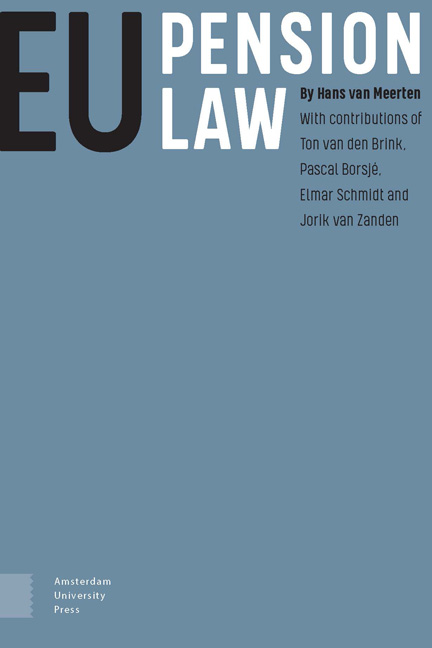Book contents
- Frontmatter
- Contents
- Abbreviations
- Preface
- Foreword
- 1 Introduction
- 2 The Impact of the EU’s Institutional System on Pensions Law
- 3 Occupational Pensions and the Freedom to Provide Services
- 4 The Institution for Occupational Retirement Provision (IORP) Directive
- 5 Application of EU law on Pensions: The Property Issue
- 6 PEPP
- Index
2 - The Impact of the EU’s Institutional System on Pensions Law
Published online by Cambridge University Press: 20 February 2021
- Frontmatter
- Contents
- Abbreviations
- Preface
- Foreword
- 1 Introduction
- 2 The Impact of the EU’s Institutional System on Pensions Law
- 3 Occupational Pensions and the Freedom to Provide Services
- 4 The Institution for Occupational Retirement Provision (IORP) Directive
- 5 Application of EU law on Pensions: The Property Issue
- 6 PEPP
- Index
Summary
Introduction
The central question in this chapter is how the institutional system of the EU affects the regulation of pensions at the EU level. First, the powers of the EU to regulate pensions and the way in which these are defined and limited will be examined. This involves the principles of conferred powers, subsidiarity and proportionality which establish and regulate the exercise of EU legislative powers. The second part of this chapter addresses the EU legislative system with its distinction between legislative, delegated and implementing acts. Each of these acts has individual characteristics, defining the specific powers and roles of the EU institutions and the matter such acts may cover. The impact thereof on EU pensions legislation will be assessed.
EU competences to regulate pensions: The principle of conferred powers
Is the EU competent to regulate pensions? The question is key: pensions are often considered to belong to the national domain, and also in light of the lack of general EU legislative powers. The principle of conferred powers prescribes that the EU may only act if and when the Member States have explicitly attributed the EU with the power to do so. The EU treaties, the Treaty on the EU (TEU) and the Treaty on the Functioning of the European Union (TFEU), in particular, are therefore the key documents to assess whether the EU may indeed regulate pensions in general or certain aspects thereof. These treaties include a long list of legal bases that create competences for the EU to regulate a myriad of policy areas. However, pensions law is no area in which the EU has such a specific legislative authority. Yet, this does not make the area immune to involvement of the EU legislature. As will be discussed below, this may be explained by the way in which the EU system of division of competences has been elaborated and applied in practice.
The choice of legal basis for legislative acts is often a controversial issue in legislative decision-making. It may seem straightforward that every legislative act should be based on a competence from the treaties and that it should be clear which legal basis should be chosen.
- Type
- Chapter
- Information
- EU Pension Law , pp. 27 - 54Publisher: Amsterdam University PressPrint publication year: 2019



